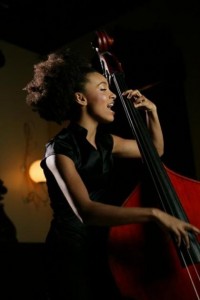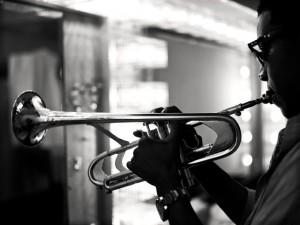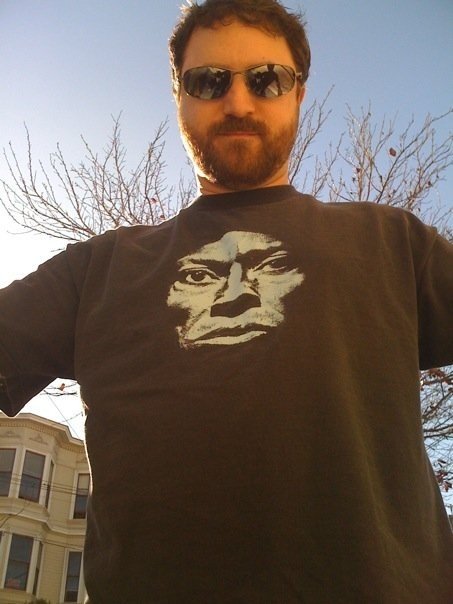The idea of the cultural relevance of art is not new. In fact, I’d argue that all art springs from the need of the artist to say something about his or her relationship to the world. It’s this relationship that makes us all unique, as no two people interact with or see the world in the same way. That’s why we say that art “speaks” to us. It’s one of the few ways we have to view, react or interact with the world through the eyes of someone else, as if they are telling us how they view things. When we look at Picasso’s paintings, we see the way he saw. When we hear John Coltrane’s music, we feel the way he felt. When we read Walt Whitman’s words, we understand what he was saying. It touches us deeply because it makes us feel another person’s point of view. It truly is a glimpse into another’s soul.
While this is not a new idea, it is one that jazz music and musicians are struggling with. In fact, cultural relevance might be the central issue for jazz in the 21st century.
Jazz in the Present Tense
A few months ago I went to see the movie Icons Among Us: Jazz in the Present Tense. It was showing at Northwest Film Forum as part of the Earshot Jazz Festival. I’m still processing all the thoughts it brought up, but one of the most interesting and important points in the film was made by writer Paul DeBarros (a Seattle guy):
If you look back at what we now consider a golden age in the music, the 50’s and 60’s, you think of more than music. You think of integration, the civil rights movement, you think of a kind of bohemian outsiderism. The problem jazz faces right now is that if you say “jazz” to somebody they don’t have something obvious in the present culture they can connect it with. What is it actually saying? [It needs] something obvious in the present culture they can connect it with.
As jazz musicians, this is a central issue that we have to struggle with. Without getting into the tired rhetoric of the jazz wars, I do think it’s imperative that we try to connect our music to our own culture, our own experience of the world, our own lives. This is what makes the music of the 50’s and 60’s so powerful, that it was speaking directly to the issues of the day. But when we play that music now, however skillfully we may play it, isn’t it still referencing a bygone era? It’s the reason Miles Davis stopped playing the music that made him famous. It’s the reason Coltrane experimented with different song forms and extended group improvisations. And it’s the reason that cats like Dave Holland, Esperanza Spalding, Christian Scott and Aaron Parks are trying to fuse the music of our time with various jazz aesthetics.
Editor’s Note
Let me state for the record here that I am not saying we shouldn’t play standards and/or play in the language of bebop or post-bop. These forms still have their place. In fact, a significant portion of my income is derived from playing this way. What I’m talking about here is the need to connect art with the current culture in order to be relevant and grow the audience for jazz. While playing standards does serve a legitimate purpose, it is probably not what will help the music appeal to more and more people.
Music as Cultural Identity
The great bassist Dave Holland recently spent a week teaching at the Birmingham Conservetoire in England, and the whole thing was documented by the students with video cameras. There’s a wealth of great stuff for the jazz junkie here! But one of the most interesting videos, and one that speaks to the topic at hand, is this one where Dave speaks about music as cultural identity, and does so from his own experience playing music that is so closely linked to someone else’s culture rather than his own.
One of the things that gave the music, and still gives the music, great power is the cultural identity that the music represents. It’s not just an entertainment. It’s not just about, you know, putting on a show. It’s about expressing who you are, and who you are as a culture, and as a race, or as a people.
Here’s the whole thing:
Dave Holland on music as cultural identity from Andrew Dubber on Vimeo.
Idol Worship
There is a nice profile of bassist Esperanza Spalding in the latest edition of The New Yorker. The interviewer talked to her just after she spent a week playing with legendary pianist McCoy Tyner. While Spalding says she really enjoyed the week, it also
…reaffirmed my understanding of the music – that the most important artist and the most important time is, like, right now. It’s the people who are learning now, and creating new things right now. Idol worship doesn’t help this music in any way.
She is definitely blazing her own trail in so many ways, being a female singing bassist in a male-dominated instrumental world!
Have a Vision
I just read this interview with the young trumpeter Christian Scott in which he gets into some of these same ideas. I applaud Christian for trying to speak to his times and his way of dealing with the world around him. But it’s not like he’s disregarding what came before him. Rather, he is using the ideas he’s learned from the jazz musicians that preceded him, not the music itself.
I’ve had the experience of being around a lot of older musicians. I learned all these different styles and all the old guys said ‘amen to what you’re doing, if you have a vision.’ So I’ve never bought into ‘this is what it is, and if it’s not that, then it’s wrong,’ because most of the older musicians don’t feel like that, they just create. I’m not buying into trying to please people, worrying they won’t like my music.
Christian is a prefect example of a young cat who has studied the music diligently and intently, and taken the spirit of it to heart. He’s not interested in rehashing the styles of the past, but in using the same aesthetic that produced such powerful, of-it’s-time music, to make music of this time.
Here’s a cool YouTube video I just found of Christian talking about some records that inspired him. He speaks exactly to what I’m talking about above:
Making the Music of Now
Parks (another Seattle guy) expresses similar views in this interview with Seattle jazz radio station KPLU:
I think there’s something happening nowadays where that door that’s been opened for us [covering rock and other forms of music], we’re starting to like really walk through it all the way — and unapologetically. You know, we’re not really – here’s a lot of people who are not concerned with what the jazz traditionalists think anymore. Because the fact of the matter, form my perspective – I really love classic jazz, I love it so much. But that was music that was so of it’s time, so tied to its time, it could only be made in that time. Trying to make that music now, it doesn’t reflect the experience of somebody living now. And so what the people, you know, a lot of my generation, we’re making the music of now. We’re not trying – we’re not caring about whether you call it jazz or whatever. We love jazz, but we don’t care about what the definition is.
Parks is not playing music that is contrived to be something different than what came before him. He is simply making music that reflects his world, the way he sees it and interacts with it. He’s doing exactly what his heroes did. Armstrong, Ellington, Parker, Mingus, Coleman, Hancock…they laid the groundwork for us. It’s up to us to use the lessons they taught us, not necessarily the music they left us, to forge our own path and tell our own story.
The Revolution Will be Internet-ized
Luckily, this is happening all over. As Parks said, there’s a whole generation (or two) that is telling its own story. The four I mention here are but a small sampling of the musicians, young and old, who are trying to find out just how the jazz music of today correlates with the culture of today. And there are folks on the web spreading the gospel, like the good folks at Nextbop.com and Barry Dallman, just to name a couple. I’m glad that my contemporaries, be they jazz musicians, writers or just plain fans, are acknowledging this shift in the music and attempting to alert the world that this is not their parents’ jazz. It’s vital, it’s relevant, and it’s a whole lot of fun!
So tell your own story in whatever language you choose. This is how we will make music of our time, and connect it to our culture.







Matthew Shipp talks about the cultural relevance of jazz in the article I wrote on him for the first issue of Burning Ambulance (click my name for the link). He says jazz has no cultural relevance anymore, but the idea of being “jazzy” has a great deal of cultural cachet. Jazz has become a style affectation. Which of course hasn’t stopped him or anyone else from making music.
Hi Phil,
Thanks for checking out the blog! I haven’t read your article yet, but I’m wondering: did Shipp mean jazz can’t have cultural relevance anymore, or just that it doesn’t at the moment? I think there’s a difference. And I’d be surprised to hear him say that his own music doesn’t have cultural relevance (although I shouldn’t be surprised at anything he has to say anymore…).
At some point, we have to consider simply retiring the word “jazz,” don’t we? You or I or anyone else can insist that jazz is not an irrelevant museum piece, but at the same time, jazz has a connotation to many people which directly opposes our claims. Abandoning the word jazz is easier said than done, though.
And of course, we’d need another neologism for marketing purposes…
This is the exact quote:
“I would say, to me, jazz absolutely has no part of American culture right now,” he says. “I think the idea of jazz has a big part, and I think there are a lot of things that are jazzy, but I think we’re really divorced from the idea of people sitting down and listening to instrumental music. Obviously a jazz musician couldn’t work in America if there wasn’t an audience. I’m not saying that there’s not people. But as far as the broad culture – obviously in the ’60s there was a place for it in the culture. In the ’70s it becomes purely an art music that is supported by funding, even though there’s a modicum of jazz radio and even some jazz hits, if you go to, like, Chuck Mangione’s ‘Feels So Good,’ stuff like that. But once you get to the ’80s you have the beginning of Marsalis-ism. And then the image of jazz is a guy who could also record a Mozart album, and it’s completely corporate-controlled. So jazz has a part in the culture, in that if a person can from the get-go make a certain amount of money and exist on an uber-yuppie level, even though no one cares about their music or really listens to it, the image of them being successful and making money is allowed to seep into the general culture, so you can have an allusion to Wynton Marsalis on The Cosby Show in the ’80s. Which is fine. I want to make a lot of money. I want to be comfortable. And I want the accoutrements that go with mainstream success, but being able to maintain my own thing. But all that is to say that jazz’s place in the culture now is the idea of something jazzy is very much a part of the culture, but not actually dealing with the essence of the language of the music. That’s a lost cause in American culture, although there is an audience for it.”
Thanks for posting the quote, Phil! Sounds very Shippian! 😉
I do agree with him to a point, though. I believe that the idea of “jazz” (or “jazzy”, as he says) is a very different thing in America than the music itself. The image of the well-coiffed guy in a suit playing cool music to an audience of upper-middle class white people is strong indeed.
But unlike Shipp, I don’t believe it is a lost cause. There are so many artists out there who are turning heads and changing people’s attitudes, one by one. The fact that folks like the ones I mentioned in this post, as well as Vijay Iyer, Darcy James Argue, Kneebody, The Teaching, Speak, etc. etc. are out there gaining fans for themselves and for the music give me great hope. This new breed of jazz musician is well-versed in the history but blazing a trail to the future in ways that haven’t been seen in a couple decades, at least here in the US. And this is not to mention the European artists that have been forging their own culturally relevant jazz all the while.
And Dave, it may be that the word “jazz” has been a bit of an albatross, but i don’t think we need to abandon it. In marketing our music we may choose to downplay it at times, but in the end, we are a continuation of the lineage and I don’t think we need to apologize for that. Every leap forward in the music has come with tumult and challenge.
I think we’re up to the challenge.
As a young budding Jazz musician, I was always struck by how close-minded some (but not all) older, more experience musicians were.
It seems like such an obvious part of the jazz equation, yet it’s so often forgotten: Jazz is about moving forward and innovating–even when standing on the shoulders of those who’ve come before us.
This is all that can save Jazz from the ugly an unfortunate death that has occurred with western classical music.
Stumbled across your blog. Really enjoying this topic and all the comments. Jazz, just like any other type of music needs to move forward or it stagnates.
Hello Jason:
The other day I was talking about jazz, repeating a phrase I like to use “jazz is playground”, there’s no need to bury “the word jazz”, jazz is freedom, a world of open doors and windows.
And about cultural relevance, well, that’s human nature, and art just another form to express that nature.
I believe in a combination of elements, the sense of community, the openness to others ideas and perspectives, the interaction and interchange.
No man is an island, music, or no music involved…
Best wishes, as always,
Federico (aka euskir)
I think
-the energy and drive
-the intelligence
-the articulateness
-and above all the quality of the music
of the generation now taking jazz forwards is unstoppable. From what I see going on right now, in five years’ time, maybe less, the answer to the question of cultural relevance will be self-evident.
Great think-piece, Jason. This is all just beginning. More power to you.
Hi Jason-
Been subscribing to your blog for a couple months now, and appreciated this latest post (cultural relevance). It’s an issue that always comes up in frequent discussions about teacher-training (I’m a PhD music ed student @ Northwestern), and what’s usually pointed out revolves around the relevance of Western art music, but this issue is just as important in jazz, for sure, a point I continue to try to make w/ my colleagues. Glad to hear it.
Some good trumpet action going on in Seattle! Just had a quick hang w/ Jay Thomas and Chad McCullough out at the Lionel Hampton jazz fest in ID last month. Looking forward to catching all you cats some time in the future. Any plans to come to Chicago?
Cheers,
Jon
Jason
Thanks for covering so much territory and providing so much food for thought.
I took a less impassioned approach last fall when I briefly discussed “cultural relevance” here:
http://communities.canada.com/ottawacitizen/blogs/jazzblog/archive/2009/09/02/ali-berkok-s-five-burning-questions.aspx
Maybe I need to take another run.
Cheers
Peter
Interesting discussion –
I just recently started playing bass with a young-ish (well, younger than my 50-something-ish self) rock guy here in town who’s begun exploring the Sinatra/Bobby Darin etc. repertoire, playing in rock clubs sandwiched between rock bands and using burlesque dancers as part of the act. While it may seem far afield from what we think of as “jazz”, it is all about standards and a sincere interest in learning to swing.
And just this week I’ve been listening to lots of stuff from SXSW and wondering where the jazz is there? How come Darcy James Argue isn’t there? Or Tain Watts? or maybe they are and I’m just not hearing about it…
Not sure what it all means, but I wouldn’t give up on jazz just yet 🙂
Our present culture has little value for high art, and much of jazz fits in that category. Then there is jazz that remembers it’s origins as Storyville whorehouse music and can still connect with folks at a street level.
{ 2 trackbacks }